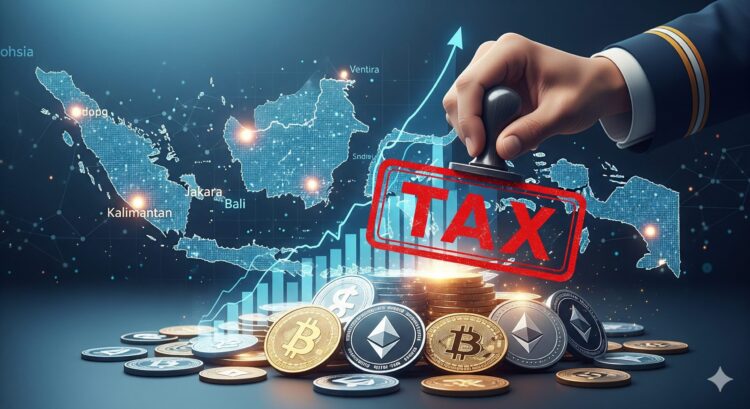Indonesia is one of Southeast Asia’s most active cryptocurrency markets, with millions of traders and steadily rising transaction volumes. The country’s youthful, tech-savvy population, combined with growing interest in digital assets as an investment and payment option, has fueled this surge.
By 2024, Indonesia ranked among the top nations globally for crypto adoption, with trading activity spanning both centralized exchanges and peer-to-peer platforms. In 2022, Indonesia introduced its first crypto tax framework, prompting many traders to ask, “is there income tax on cryptocurrency?” The law applied a 0.1% value-added tax (VAT) and a 0.1% income tax on crypto transactions.
While initially seen as manageable, the government’s recent decision to raise Indonesia tax rates has drawn widespread attention. Supporters argue it could boost state revenue, while critics warn it may dampen market activity and push traders toward offshore or unregulated platforms, making this policy shift a hot topic in the country’s financial space.
What’s Changing: Breakdown of the New Tax Structure

As of August 1, 2025, cryptocurrency sales on domestic exchanges will incur a final income tax (PPh Article 22) of 0.21% per transaction, up from the previous 0.10%. Trades conducted via foreign (unregistered) platforms face a higher tax rate of 1%, up from 0.20%.
Importantly, Value-Added Tax (VAT) on crypto asset sales has been entirely eliminated, and crypto is now treated like a security rather than a commodity. Meanwhile, crypto miners will see the VAT on mining climb to 2.2% (from 1.1%), and the previous 0.1% special income tax will be phased out by 2026. From that point, mining income will fall under normal personal or corporate income crypto tax in Indonesia.
Which Assets and Transactions Are Affected
The changes apply specifically to crypto asset sales and trades via exchanges. VAT exemption applies only to the asset transfers themselves, while associated services, such as exchange platforms and mining operations, remain taxable.
A uniform 0.21% final PPh applies to all domestic exchange sales, regardless of platform registration. Foreign exchange trades will be taxed at 1%, with enforcement designed to promote the use of compliant local services.
Timeline and Government Objectives
These rules were introduced under Ministerial Regulation (PMK) No. 50/2025 and PMK No. 53/2025, taking effect on August 1, 2025. The policy reflects Indonesia’s shift in classifying cryptocurrencies as financial assets, moving oversight from the commodity regulator (Bappebti) to the Financial Services Authority (OJK).
The primary objectives are to streamline taxation, increase revenue within a booming digital asset market, and encourage traders and miners to support domestic platforms. By lowering VAT burdens and standardizing income tax rates, policymakers aim to balance fiscal goals with market growth and transparency.
Impact on Local Traders and Crypto Exchanges
The new tax structure is poised to significantly influence how both individual traders and local exchanges operate in Indonesia’s crypto market.
Effect on trading costs and profit margins for retail investors
The higher Indonesia tax on crypto, the higher the cost of every buy and sell order, shrinking profit margins, especially for small-scale traders who rely on frequent trades. Even modest gains could be eroded by the cumulative effect of taxes, making day trading and short-term speculation less attractive.
How exchanges may adjust operations
To offset the potential drop in trading activity, exchanges might lower their platform fees, offer promotional incentives, or expand loyalty programs. However, they’ll also need to invest in stronger tax compliance systems to meet government reporting requirements, which could raise operational costs.
Potential barriers for new crypto investors in Indonesia
For newcomers, the added tax burden could serve as a deterrent, making the entry point into crypto feel riskier and less profitable. This may slow market growth, as casual investors weigh the reduced upside against the complexity of tax obligations.
Read More About DeFi Taxes: The Ultimate Guide to DeFi Taxes
Comparison with Global Crypto Tax Policies
With the increased transaction tax and VAT/PPh, Indonesia’s tax rate now sits among the higher brackets in Asia. Japan, for instance, taxes crypto gains as miscellaneous income at rates that can exceed 50% for high earners, while Singapore maintains a zero capital gains tax policy for individuals.
India imposes a flat 30% tax on crypto gains plus a 1% TDS (tax deducted at source) on transactions. Indonesia’s model is less severe than India’s in direct capital gains terms. However, the combination of transaction and value-added taxes means frequent traders may still face a notable tax drag on their activities.
You May Find This Interesting: Why is Crypto Thriving in India Despite Discouraging Tax Regime
While Indonesia has strong potential to grow as a Southeast Asian crypto hub, higher Indonesia tax on crypto could dampen that trajectory. Countries with more favourable tax regimes, such as Singapore or the Philippines, may attract startups, exchanges, and institutional investors that might have otherwise set up in Indonesia.
Unless balanced with clear regulations, innovation incentives, or tax breaks for certain crypto activities, the new policy could push Indonesia toward being a regulatory follower rather than a regional leader.
Potential Market Reactions
Indonesia’s new tax trend could trigger varied market responses, from capital outflows to innovative compliance solutions.
- Possible capital flight to offshore exchanges or decentralized platforms: Traders may shift activity to offshore or decentralized exchanges to avoid high local tax burdens.
- Increased focus on tax-compliant products and reporting tools: Exchanges and fintech firms could introduce services that simplify reporting and minimize tax risks.
- Incentives for innovation in DeFi, P2P trading, and stablecoin adoption: The policy may accelerate demand for alternative, tax-efficient financial tools and trading methods.
READ MORE: Navigating Crypto Taxes in 2025
Final Take: Investor Considerations Moving Forward
Investors in Indonesia should start prioritizing effective tax management strategies to minimize the impact of new regulations. This includes maintaining accurate and detailed records of every crypto transaction, strategically timing trades to optimize tax liabilities, and using platforms or tools designed for easy tax reporting. By staying organized about crypto tax in Indonesia, investors can avoid unexpected penalties and better manage their overall portfolio performance.
Equally important is staying informed about evolving local regulations. Understanding whether these measures point toward a more tightly controlled or cautiously monitored crypto environment will help investors adapt their strategies. In a market where regulations are becoming central to participation, awareness, and preparation could be the difference between thriving and struggling in Indonesia’s crypto future.
Disclaimer: This article is intended solely for informational purposes and should not be considered trading or investment advice. Nothing herein should be construed as financial, legal, or tax advice. Trading or investing in cryptocurrencies carries a considerable risk of financial loss. Always conduct due diligence.
If you would like to read more articles like this, visit DeFi Planet and follow us on Twitter, LinkedIn, Facebook, Instagram, and CoinMarketCap Community.
Take control of your crypto portfolio with MARKETS PRO, DeFi Planet’s suite of analytics tools.”




















